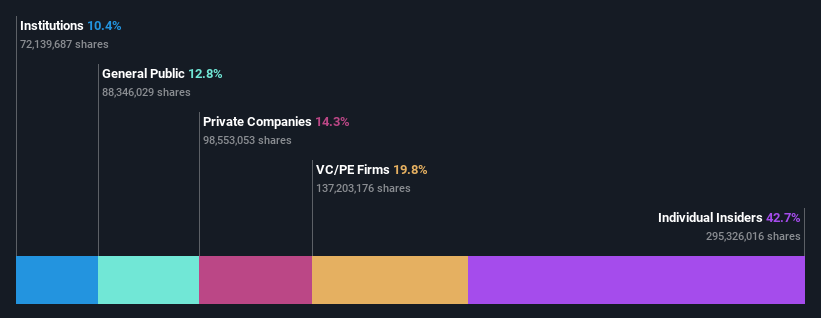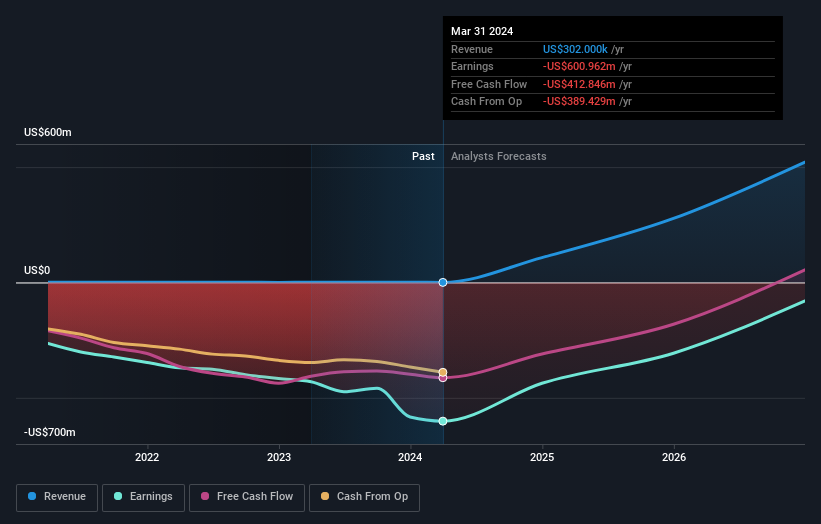Stock Analysis
- United States
- /
- Biotech
- /
- NasdaqGS:IBRX
Chief Scientific Officer Patrick Soon-Shiong, ImmunityBio, Inc.'s (NASDAQ:IBRX) largest shareholder sees value of holdings go down 7.2% after recent drop

Key Insights
- ImmunityBio's significant insider ownership suggests inherent interests in company's expansion
- 62% of the business is held by the top 2 shareholders
- 10% of ImmunityBio is held by Institutions
A look at the shareholders of ImmunityBio, Inc. (NASDAQ:IBRX) can tell us which group is most powerful. With 43% stake, individual insiders possess the maximum shares in the company. Put another way, the group faces the maximum upside potential (or downside risk).
As a result, insiders as a group endured the highest losses after market cap fell by US$339m.
In the chart below, we zoom in on the different ownership groups of ImmunityBio.
View our latest analysis for ImmunityBio

What Does The Institutional Ownership Tell Us About ImmunityBio?
Institutional investors commonly compare their own returns to the returns of a commonly followed index. So they generally do consider buying larger companies that are included in the relevant benchmark index.
ImmunityBio already has institutions on the share registry. Indeed, they own a respectable stake in the company. This suggests some credibility amongst professional investors. But we can't rely on that fact alone since institutions make bad investments sometimes, just like everyone does. It is not uncommon to see a big share price drop if two large institutional investors try to sell out of a stock at the same time. So it is worth checking the past earnings trajectory of ImmunityBio, (below). Of course, keep in mind that there are other factors to consider, too.

Hedge funds don't have many shares in ImmunityBio. From our data, we infer that the largest shareholder is Patrick Soon-Shiong (who also holds the title of Chief Scientific Officer) with 42% of shares outstanding. Its usually considered a good sign when insiders own a significant number of shares in the company, and in this case, we're glad to see a company insider play the role of a key stakeholder. California Capital Equity, LLC is the second largest shareholder owning 20% of common stock, and NantWorks, LLC holds about 14% of the company stock.
After doing some more digging, we found that the top 2 shareholders collectively control more than half of the company's shares, implying that they have considerable power to influence the company's decisions.
While studying institutional ownership for a company can add value to your research, it is also a good practice to research analyst recommendations to get a deeper understand of a stock's expected performance. There is a little analyst coverage of the stock, but not much. So there is room for it to gain more coverage.
Insider Ownership Of ImmunityBio
While the precise definition of an insider can be subjective, almost everyone considers board members to be insiders. Company management run the business, but the CEO will answer to the board, even if he or she is a member of it.
Insider ownership is positive when it signals leadership are thinking like the true owners of the company. However, high insider ownership can also give immense power to a small group within the company. This can be negative in some circumstances.
Our most recent data indicates that insiders own a reasonable proportion of ImmunityBio, Inc.. It is very interesting to see that insiders have a meaningful US$1.9b stake in this US$4.3b business. Most would be pleased to see the board is investing alongside them. You may wish to access this free chart showing recent trading by insiders.
General Public Ownership
With a 13% ownership, the general public, mostly comprising of individual investors, have some degree of sway over ImmunityBio. While this group can't necessarily call the shots, it can certainly have a real influence on how the company is run.
Private Equity Ownership
Private equity firms hold a 20% stake in ImmunityBio. This suggests they can be influential in key policy decisions. Some might like this, because private equity are sometimes activists who hold management accountable. But other times, private equity is selling out, having taking the company public.
Private Company Ownership
Our data indicates that Private Companies hold 14%, of the company's shares. It's hard to draw any conclusions from this fact alone, so its worth looking into who owns those private companies. Sometimes insiders or other related parties have an interest in shares in a public company through a separate private company.
Next Steps:
While it is well worth considering the different groups that own a company, there are other factors that are even more important. Like risks, for instance. Every company has them, and we've spotted 6 warning signs for ImmunityBio (of which 5 are concerning!) you should know about.
But ultimately it is the future, not the past, that will determine how well the owners of this business will do. Therefore we think it advisable to take a look at this free report showing whether analysts are predicting a brighter future.
NB: Figures in this article are calculated using data from the last twelve months, which refer to the 12-month period ending on the last date of the month the financial statement is dated. This may not be consistent with full year annual report figures.
Valuation is complex, but we're helping make it simple.
Find out whether ImmunityBio is potentially over or undervalued by checking out our comprehensive analysis, which includes fair value estimates, risks and warnings, dividends, insider transactions and financial health.
View the Free AnalysisHave feedback on this article? Concerned about the content? Get in touch with us directly. Alternatively, email editorial-team (at) simplywallst.com.
This article by Simply Wall St is general in nature. We provide commentary based on historical data and analyst forecasts only using an unbiased methodology and our articles are not intended to be financial advice. It does not constitute a recommendation to buy or sell any stock, and does not take account of your objectives, or your financial situation. We aim to bring you long-term focused analysis driven by fundamental data. Note that our analysis may not factor in the latest price-sensitive company announcements or qualitative material. Simply Wall St has no position in any stocks mentioned.
Valuation is complex, but we're helping make it simple.
Find out whether ImmunityBio is potentially over or undervalued by checking out our comprehensive analysis, which includes fair value estimates, risks and warnings, dividends, insider transactions and financial health.
View the Free AnalysisHave feedback on this article? Concerned about the content? Get in touch with us directly. Alternatively, email editorial-team@simplywallst.com
About NasdaqGS:IBRX
ImmunityBio
A clinical-stage biotechnology company, engages in developing therapies and vaccines that bolster the natural immune system to defeat cancers and infectious diseases.
Medium and slightly overvalued.

